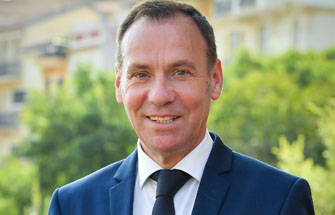On the effort to prevent money laundering, SICCFIN (Service d’Information et de Contrôle sur les Circuits Financiers) has been very busy with the MONEYVAL National Risk Assessment and the fallout from the conflict between Russia and Ukraine. We talk to Michel HUNAULT, the Director-General of the Principality’s anti-money laundering authority.
How does SICCFIN cooperate with the Monaco Association for Financial Activities (AMAF)?
SICCFIN and AMAF are in regular contact. In 2021, witnessed by Minister Jean CASTELLINI and Etienne FRANZI, President of the AMAF, I signed a framework agreement which updated the conditions and procedures for “on-site audits” of banks by SICCFIN’s Oversight Team. In future, the challenge of digitisation and digitalisation (I’m thinking in particular about the procedures for sending suspicious transaction reports to the Investigation Team) will be the subject of standardisation, with a view to ensuring the security of communications and making it easier to process reports. Our relationship relies on trust between financial institutions and SICCFIN, which must ensure the confidentiality of sources under all circumstances.
How does Monaco’s MONEYVAL Evaluation work?
The Principality is assessed by MONEYVAL, a specialist body of the Council of Europe, which the Principality joined in 2004. MONEYVAL is a Committee of Experts on the Evaluation of Anti-Money Laundering Measures and the Financing of Terrorism (AML/CFT); in parallel, measures to prevent corruption are assessed by the Council of Europe’s Group of States against Corruption (GRECO).
The MONEYVAL team recently visited the Principality of Monaco. Its aims were to verify the country’s compliance with international recommendations on preventing money laundering and terrorist financing, and to validate the effectiveness of Monaco’s provisions. I would like to welcome the commitment shown both across government and on the part of the industry, and particularly by the Monaco Association for Financial Activities and its various representatives, who answered questions and were able to demonstrate their vigilance in complying with prevention measures and the declaratory mechanism available to them in the event of breaches. They showed a level of knowledge and professionalism that was appreciated by MONEYVAL.
In the conflict between Russia and Ukraine, the importance of sanctions on money laundering and terrorist financing are clear...
The outbreak of war in Ukraine resulted in a standardisation of the responses of European countries through application of the European Regulation on sanctions (asset freezing, etc.) and highlighted the need for full cooperation between European Union member states. The Principality has demonstrated its responsiveness and the effectiveness of its efforts to apply the European Regulation on asset freezing thanks to the setting up of a file of bank accounts, effective beneficiaries, companies, trusts, and so on. These tools have enabled the Principality to act credibly in applying sanctions. At a time when Europe is taking steps to create a specialist agency to combat money laundering and terrorist financing,
I suggest that Monaco positions itself to become an observer of this organisation, with a view to joining it. The challenge is twofold: standardising criminal offences and thus legislation through the EU’s future sixth directive, and tackling the issue of crypto assets and blockchain, which have proved to be an important means for Russia to mitigate international financial sanctions.






